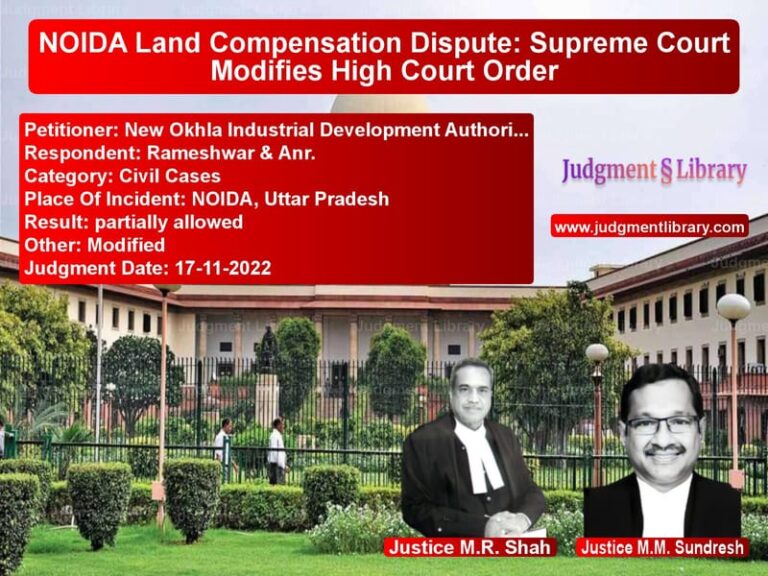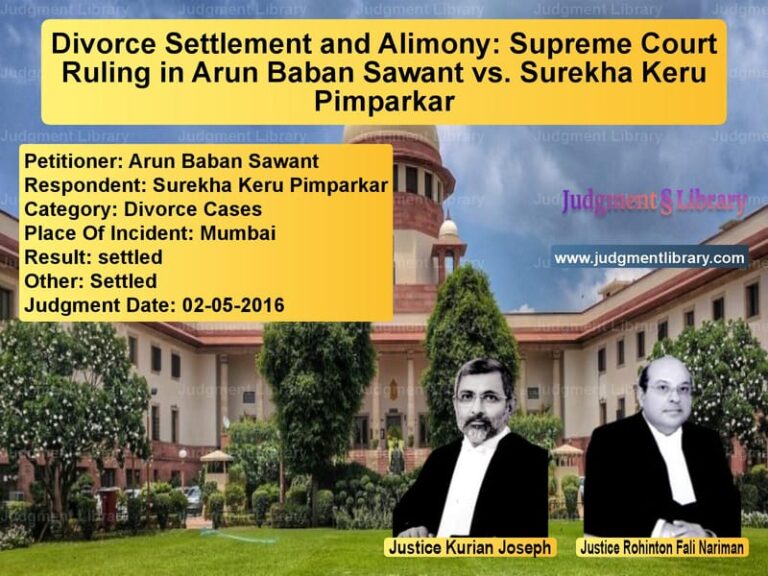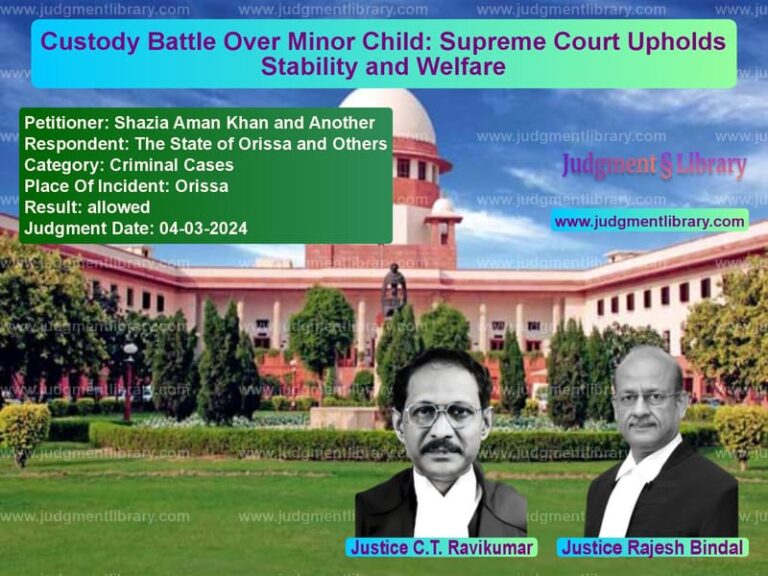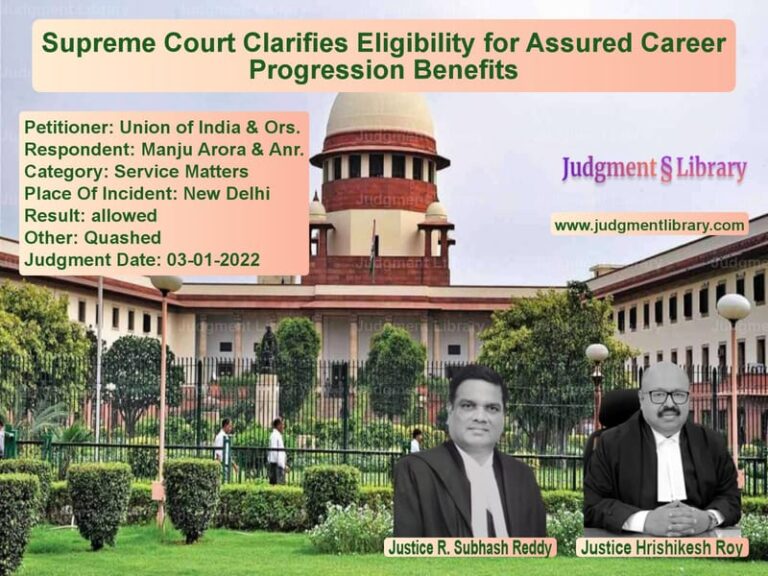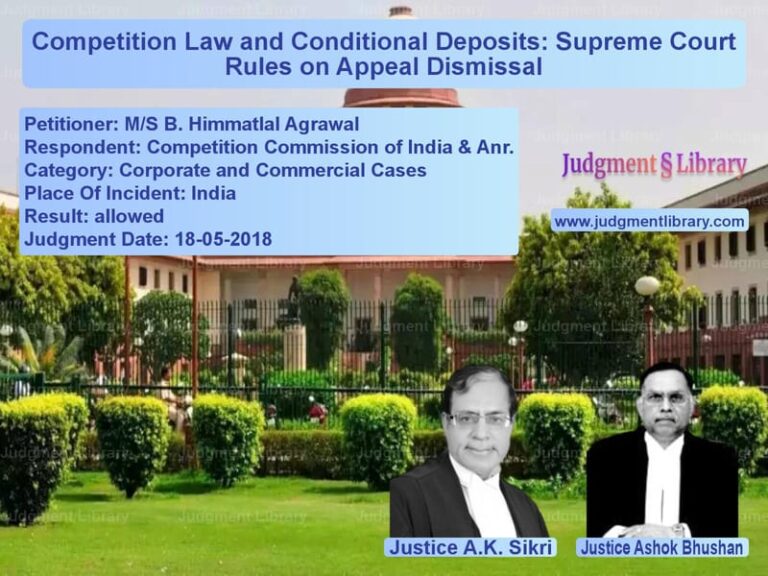Supreme Court Acquits Accused in Kerala Murder Case: Examining the Evidence and Legal Reasoning
The case of Boby v. State of Kerala is a crucial criminal appeal where the Supreme Court of India overturned the conviction of the appellant, Boby, who was earlier sentenced to life imprisonment for murder and related offenses. The judgment highlights key principles of criminal jurisprudence, particularly the role of circumstantial evidence and the legal requirements for proving guilt beyond a reasonable doubt.
In this case, the appellant was convicted by the trial court and the Kerala High Court for the murder of one Vishwanathan. The conviction was based on circumstantial evidence, including the last seen theory, alleged recovery of stolen goods, and a confession statement. The Supreme Court, upon detailed scrutiny, found the prosecution’s case lacking in conclusive evidence and ruled that the conviction could not be sustained.
Background of the Case
The case dates back to November 21, 2000, when Leela, the wife of the deceased Vishwanathan, filed a complaint at Anthikkadu Police Station, Thrissur. She alleged that her husband was forcefully taken away by his brother Shibu @ Shibu Singh (Accused No.1) and others. The prosecution’s case was based on the following allegations:
- Accused No.1 (Shibu @ Shibu Singh) was a convict who had escaped from prison.
- On November 20, 2000, a group of men, including the appellant, allegedly kidnapped Vishwanathan at knifepoint.
- Leela was also taken in a vehicle but later released in her native place.
- Vishwanathan’s body was later recovered buried near the Bharathapuzha river.
Key Legal Issues
1. Circumstantial Evidence and Last Seen Theory
The trial court relied on the last seen theory to convict the accused, stating that the deceased was last seen alive with the accused before his disappearance. The Supreme Court examined whether the prosecution had conclusively proven this claim.
2. Recovery of Stolen Goods and Dead Body
The prosecution alleged that Boby’s confession led to the discovery of the dead body. However, the defense argued that there was no proper memorandum under Section 27 of the Indian Evidence Act to validate this claim.
3. Inconsistencies in Witness Statements
The appellant’s defense highlighted several inconsistencies in the prosecution witnesses’ statements, which raised doubts about the reliability of their testimonies.
Supreme Court’s Analysis
1. Importance of Proving Circumstantial Evidence
The Supreme Court relied on the principles established in Sharad Birdhichand Sarda v. State of Maharashtra, stating that circumstantial evidence must form an unbroken chain leading to the guilt of the accused.
Read also: https://judgmentlibrary.com/sc-quashes-criminal-proceedings-abuse-of-sc-st-act-in-property-dispute/
The Court ruled:
“The circumstances from which the conclusion of guilt is to be drawn should be fully established and should exclude every possible hypothesis except the one to be proved.”
2. Flaws in the Last Seen Theory
The Court observed that the gap between the last sighting of the deceased and the recovery of his body was too long to rule out third-party involvement. It cited State of U.P. v. Satish to emphasize that unless the time gap is minimal, the last seen theory alone cannot justify conviction.
3. Illegality in Recovery of Evidence
The Supreme Court found serious flaws in the way the dead body and stolen goods were allegedly recovered:
- No proper record under Section 27 of the Indian Evidence Act to validate Boby’s confession leading to recovery.
- The trial court itself acknowledged inconsistencies in the recovery memorandum.
- The alleged recovery of the murder weapon was from a location already known to the police, making it inadmissible.
Final Judgment
The Supreme Court concluded:
“The prosecution has utterly failed to prove the chain of incriminating circumstances which leads to no other conclusion than the guilt of the accused.”
Thus, the Supreme Court allowed the appeal and set aside the conviction. The appellant was acquitted of all charges, and his bail bonds were discharged.
Impact of the Judgment
- Reinforcement of Fair Trial Principles: The judgment underscores that convictions must be based on conclusive and credible evidence.
- Clarification on Last Seen Theory: This case serves as a precedent for ensuring the time gap in last seen cases is minimal before applying the doctrine.
- Protection Against False Recoveries: The ruling highlights the importance of properly recording and corroborating recoveries to prevent misuse of Section 27 of the Evidence Act.
The Supreme Court’s decision in this case reaffirms the fundamental principle that an accused must be proven guilty beyond a reasonable doubt, ensuring that justice is not compromised by weak or manipulated evidence.
Petitioner Name: Boby.Respondent Name: State of Kerala.Judgment By: Justice B.R. Gavai, Justice M.M. Sundresh.Place Of Incident: Thrissur, Kerala.Judgment Date: 12-01-2023.
Don’t miss out on the full details! Download the complete judgment in PDF format below and gain valuable insights instantly!
Download Judgment: boby-vs-state-of-kerala-supreme-court-of-india-judgment-dated-12-01-2023.pdf
Directly Download Judgment: Directly download this Judgment
See all petitions in Murder Cases
See all petitions in Bail and Anticipatory Bail
See all petitions in Fraud and Forgery
See all petitions in Custodial Deaths and Police Misconduct
See all petitions in Judgment by B R Gavai
See all petitions in Judgment by M.M. Sundresh
See all petitions in allowed
See all petitions in Quashed
See all petitions in supreme court of India judgments January 2023
See all petitions in 2023 judgments
See all posts in Criminal Cases Category
See all allowed petitions in Criminal Cases Category
See all Dismissed petitions in Criminal Cases Category
See all partially allowed petitions in Criminal Cases Category


